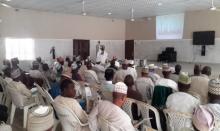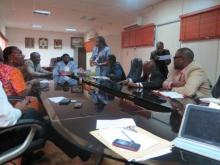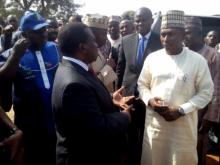Lassa fever outbreak in Nigeria: Federal Ministry of Health restates commitment to halt the epidemic
Abuja, 15 January, 2016 -- Lassa fever, which is endemic in Nigeria, has between late December 2015 and January 14, 2016 resulted in 53 deaths in 10 states and the Federal Capital Territory (FCT).
Lassa fever outbreak is a yearly occurrence during the dry season in Nigeria but, this year’s outbreak is more widespread with 10 states, 140 suspected and 30 confirmed cases. The case fatality rate (CFR) is significantly high at 53 or 37.9% of all cases.
The outbreak is so far affecting Bauchi, Nasarawa, Niger, Taraba, Kano, Rivers, Edo, Oyo, Plateau states and the FCT, with Niger being the most affected with 48 cases and 16 deaths. Epidemiological link between the outbreaks of the different states has so far not been established.
Speaking at a media briefing on 08 January 2016, the Honourable Minister of Health, Professor Isaac Adewole, declared an outbreak and reiterated the Federal Government’s commitment to quickly contain it. He assured the public that “Nigeria has the capability to diagnose Lassa fever” and that “all confirmed cases were diagnosed by the country’s laboratories”. However, because the symptoms of Lassa fever are so varied and non-specific, clinical diagnosis is often difficult, especially early in the course of the disease.
Professor Adewole also directed all health facilities in the country to emphasize routine infection prevention and control measures and ensure all patients are treated free. Furthermore, he advised family members and health care workers to always be careful to avoid contact with blood and body fluids while caring for sick persons.
The minister reiterated that no travel restrictions will be imposed from and to the areas currently affected. He further indicated that the World Health Organization (WHO) is being notified of all confirmed cases in line with International Health Regulations. He further thanked WHO and other partners for their support.
Professor Adewole subsquently visited the most affected state of Niger on 14 January 2016 to mobilize local leadership and further galvanize the response.
The WHO Officer in charge, Dr Rex Mpazanje, indicated that WHO is supporting the federal and state ministries of health through its polio structure to sensitize all health care workers in all health facilities to have a high index of suspicion and capacity to assess any suspect case that presents. Protective personal equipment, case definition materials, suspect case evaluation and documentation materials are being made available to all health facilities coupled with orientation of the service providers.
WHO is also supporting public awareness initiatives through provision of information/ communication materials, briefing of traditional and religious leaders and airing of jingle on local radio stations.
Furthermore, the WHO State Coordinator for Kano, Dr Bashir Abba, reported that already, 60 Disease Surveillance and Notification Officers (DSNOs), 37 secondary health facilities medical directors, 55 community health workers, 40 medical laboratory scientists and 44 nomadic representatives were sensitized on surveillance and case management of Lassa fever.
Also, in Rivers state, WHO facilitated the reactivation of Emergency Operation Committee, chaired by the Honorable Commissioner for Health. WHO is also supporting decontamination of residences and health facilities associated with the three cases and facilitating safe burial practices. So far, 200 contacts have been line listed and are being actively follow-up.
Lassa fever is an acute febrile illness, with bleeding and death in severe cases, caused by the Lassa fever virus with an incubation period of 6-21 days. About 80% of human infections are asymptomatic; the remaining cases have severe multi-system disease, where the virus affects several organs in the body, such as the liver, spleen and kidneys. The onset of the disease is usually gradual, starting with fever, general weakness, and malaise followed by headache, sore throat, muscle pain, chest pain, nausea, vomiting, diarrhoea, cough, and bleeding from mouth, nose, vagina or gastrointestinal tract, and low blood pressure.
WHO fact sheet on Lassa fever
___________________________________
Technical contacts:
Dr Rex Mpazenje; Tel: +234 7803 960 0874; Email: mpazanjer [at] who.int
Dr Mary Stephen: +234 816 289 9789; Email: stephenm [at] who.int
Media contact:
Ms Charity Warigon; Tel: +234 810 221 0093; Email: warigonc [at] who.int
___________________________________
Below:
01 Honourable Minister of Health briefing Niger state Commissioner of Health on 14 January, 2015 after a field visit
02 Training of Disease Surveillance and Notification Officers in Kano
03 Stakeholders meeting with the Commissioner for Health at the EOC in Rivers






